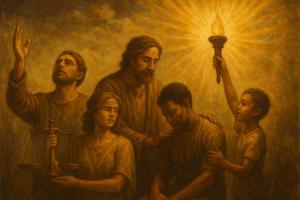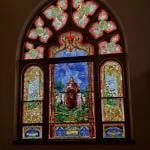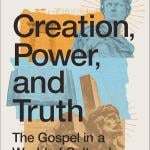5 Words of True Worship
Isaiah 58:6-12
In the book of Isaiah, chapter 58, God’s people were doing religious rituals like fasting (not eating to show devotion). They wondered why God did not seem pleased with them. Through the prophet Isaiah, God explained that true worship is more than just rituals or going to church. He cares about how we treat others every day. In Isaiah 58:6-12, God highlights five words of true worship; important ways to worship Him in daily life: practicing justice, helping those in need, shining our light, receiving God’s blessings, and restoring what is broken. We will explore these five points and see how we can live them out.
5 WORDS OF TRUE WORSHIP
Justice: Free the Oppressed and Stop Unfairness
“Isn’t this the fast I choose: To break the chains of wickedness, to untie the ropes of the yoke, to set the oppressed free, and to tear off every yoke?” (Isaiah 58:6, CSB)
“At that time, when you call, the Lord will answer; when you cry out, he will say, ‘Here I am.’ If you get rid of the yoke among you, the finger-pointing and malicious speaking,” (Isaiah 58:9, CSB)
The first word of the five words of true worship is justice. God cares about justice and fairness. In verse 6, God says He wants “to break the chains of wickedness… to set the oppressed free” . This means God wants us to stop any cruel, evil, or unfair treatment of people. He also tells us to get rid of the “yoke” – this yoke means heavy burdens or unfair rules that people suffer under. In simple words, God wants us to set people free from injustice. He even says to stop pointing fingers and speaking hurtfully about others (v. 9) because that is unfair and unkind. True worshipers stand up for what is right and defend those who are bullied or mistreated.
Justice against bullies
Imagine a student at school being bullied by others. Everyone else just watches or walks away. But one brave girl decides this is wrong. She steps in and tells the bully to stop, or she gets a teacher to help. She refuses to let the unfair treatment continue. That girl is acting with justice by freeing someone from oppression. In the same way, when we see someone being treated unfairly, we can speak up or get help. God is pleased when we treat people fairly and help those who are being wronged.
Help: Feed the Hungry and Care for the Needy
“Is it not to share your bread with the hungry, to bring the poor and homeless into your house, to clothe the naked when you see him, and not to ignore your own flesh and blood?” (Isaiah 58:7, CSB)
“and if you offer yourself to the hungry, and satisfy the afflicted one…” (Isaiah 58:10, CSB)
The second word of true worship is about helping others in need. God explains in verse 7 that true worship includes sharing with those who have less. He says to “share your bread with the hungry, to bring the poor and homeless into your house, [and] to clothe the naked when you see him” . In other words, if someone is hungry, give them food. If someone has no home or warm place, try to help them find shelter. If someone has torn or no clothes, give them clothes to wear. Don’t ignore people who need help — especially your own family (v. 7 says not to ignore your “flesh and blood,” which means your relatives). God wants us to be generous and kind. We shouldn’t turn away when we see someone struggling.
Feeding the hungry
Think about a time you saw a person who was hungry. Maybe at school you noticed a classmate who forgot their lunch. A boy decides to share half of his sandwich with that classmate so they won’t be hungry. That is a simple act of helping. Or imagine you have a coat you don’t use, and you give it to a kid who has none and is cold. That is caring for the needy. These might seem like small things, but to the person you help, it means the world. When we feed the hungry or give to the poor, we are worshiping God by showing love. God smiles when we care for others, because that is what He asked us to do.
Light: Live as a Light in the World
“Then your light will appear like the dawn…” (Isaiah 58:8, CSB)
“…then your light will shine in the darkness, and your night will be like noonday.” (Isaiah 58:10, CSB)
The third word of true worship is light. When we practice justice and kindness, the Bible says we become like a light shining in darkness. In verse 10, God promises “then your light will shine in the darkness, and your night will be like noonday” . Imagine how bright it is at noon when the sun is high in the sky—that’s how bright our lives can be in a dark world when we do what is right! Being a light means we bring hope, truth, and goodness where there is sadness, lies, or evil. In verse 8, it also says “your light will appear like the dawn.”
Just as sunrise chases away the night, our goodness can help drive away the darkness around us. People will see our actions and learn about God’s love through them. Jesus said something similar: we should let our light shine so others can see our good works and praise God (this idea is echoed in the New Testament).
Light in the darkness
Think of a completely dark room. If you light one small candle or turn on a flashlight, the darkness is not so scary anymore. It only takes a little light to make a big difference. In the same way, one person doing the right thing can inspire others.
For example, if a group of friends is gossiping (talking meanly) about someone, and you choose not to join in and instead say something kind, you are being a light. Your choice might encourage your friends to be kinder too. Or if others are cheating on a test but you refuse to cheat, you set an example. It’s like you shine a light of honesty in that situation. Living as a light means always trying to do what pleases God, so that your life shines with His love and goodness for everyone to see.
Blessing: Rely on God’s Guidance, Strength, and Provision
“…your recovery will come quickly. Your righteousness will go before you, and the Lord’s glory will be your rear guard.” (Isaiah 58:8, CSB)
“The Lord will always lead you, satisfy you in a parched land, and strengthen your bones. You will be like a watered garden and like a spring whose water never runs dry.” (Isaiah 58:11, CSB)
The fourth word of true worship is blessing. When we honor God by living out justice, helping, and being a light, God promises to take care of us. In verse 11, the scripture says, “The Lord will always lead you, satisfy you in a parched land, and strengthen your bones” . This is a way of saying God will guide you, give you what you need even in hard times (a “parched land” means a dry, difficult place), and make you strong. It also says you will be like a “watered garden” that never runs out of water . Think about a garden in the summer: if it gets water every day, the plants stay green and healthy. They don’t dry up.
In the same way, God will refresh us and give us strength and joy when we do what He asks. He will bless us with what we need to keep going. In verse 8, God even said, “your recovery will come quickly” – our wounds or problems can heal faster because God is helping us. And “the Lord’s glory will be your rear guard” – meaning God will protect us from behind, watching our back. These are amazing blessings!
It’s important to know that we don’t do good things just to get rewards. We do them because we love God and others. But God is so kind that He rewards our obedience anyway. He promises to hear us when we call out to Him (as verse 9 says, He will say “Here I am” when we pray). He gives us guidance when we are confused, strength when we feel weak, and hope when we feel down. Just like a well-watered garden, our lives will bear good fruit and not wither.
Joy from warm hearts
Have you ever helped someone and then felt a warm happiness in your heart afterward? That joy might be one of God’s blessings in you. Or maybe you were nervous to stand up for what is right, but when you did it, you felt God gave you courage and it turned out well. That is God strengthening your bones (giving you inner strength). Remember, God takes care of those who follow His ways. We can trust Him to fill us up when we pour out love to others.
Restoration: Rebuild What Is Broken
“The Lord will always lead you, satisfy you in a parched land, and strengthen your bones. You will be like a watered garden and like a spring whose water never runs dry. Some of you will rebuild the ancient ruins; you will restore the foundations laid long ago; you will be called the repairer of broken walls, the restorer of streets where people live.” (Isaiah 58:11–12, CSB)
The last word of true worship in this passage is restoration – fixing and rebuilding what is broken. In verse 12, God tells His people that if they live out true worship, “you will be called the repairer of broken walls, the restorer of streets where people live” . In ancient times, broken walls and ruined streets meant a city was in bad shape. God promises that His people will rebuild the ruins and restore things that have been destroyed. God wants us to help restore broken places and broken lives.
This can mean many things for us today. It can mean fixing broken relationships, helping to renew a community, or building up people who feel destroyed inside. True worshippers become helpers and healers, not destroyers. We look for ways to make things right again, to fix problems, and to bring people together.
Repairing a broken wall in a relationship
Think of a friendship that fell apart because of a big argument. That friendship is like a broken wall. It protects nothing and just makes both people sad. If you go and apologize or forgive, you are helping rebuild trust – you are repairing a “broken wall” in a relationship. Another example is when a neighborhood park is dirty or broken down, and families come together to clean it up and fix the playground.
They are restoring a nice place for everyone to enjoy. Even helping someone who is sad by listening to them can restore their hope. It’s like you help rebuild their broken heart. God calls us to be restorers. Instead of saying “It’s not my problem,” we can ask, “How can I help fix this?” When we do, we are living out true worship by rebuilding what is broken around us.
Knowing these five points is not enough – we should put them into practice. You don’t have to wait to be an adult to start doing them.
Application
Here are some practical ways we can live out each lesson in our daily lives:
- Practice Justice: Treat everyone fairly. If you see someone being bullied or mistreated at school, do something to help – stand with them or get an adult’s help. Don’t join in doing wrong, and don’t judge others by rumors or differences.
- Help Those in Need: Share what you have. You can give some of your lunch to a classmate who has none, or donate old clothes and toys to charity. Offer to help a neighbor or include the kid who is often left out. Look for small ways to care for people who are hungry, lonely, or in need.
- Be a Light: Wherever you are, choose to do what is right even if others aren’t. Be kind, honest, and hopeful so that people notice something positive in you. For example, be the one who says “thank you,” who refuses to cheat or lie, and who welcomes new students. Let your behavior show God’s love.
- Trust God’s Blessings: Don’t be afraid that you will lose out by helping others. Trust that God will give you what you need. Pray for His guidance each day. When you feel tired or discouraged, ask Him for strength. Remember that God promises to be with you and to take care of you, just like watering a garden.
- Work on Restoration: If you break something or hurt someone’s feelings, do your best to fix it. Say sorry and try to make things right. If you see a broken situation, maybe you can help — like cleaning up trash in your community or mediating when friends fight. Be a person who brings people together and fixes problems rather than someone who breaks things apart.
By taking these actions, we make our everyday life an act of worship to God.
Conclusion
Isaiah 58 teaches us that true worship goes far beyond just attending church or doing religious rituals. God is happy when we live out our faith by loving and helping others. He wants us to fight injustice, care for those in need, shine His light, accept His guidance and blessings, and repair what is broken. This is worship that God loves — it’s like worshiping God with our actions and not just our words.
As we go about our week, let’s remember that worship doesn’t end when the church service is over. Every day is a chance to honor God by the way we behave. Let’s put Isaiah 58 into practice: do what is right, share with others, be a light in your school or home, trust God to take care of you, and help fix what’s broken around you.
When we live like this, we are truly worshiping God beyond rituals. We become the kind of people God wants us to be — people who love Him and love others in real, tangible ways. This week, let’s each take up the challenge to worship God by the way we live!
Image generated by AI using DALL·E via ChatGPT (© 2025, OpenAI).













